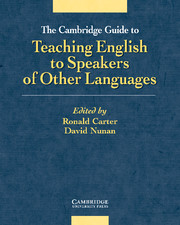Book contents
- Frontmatter
- Contents
- List of figures
- List of abbreviations
- Acknowledgements
- List of contributors
- Introduction
- Chapter 1 Listening
- Chapter 2 Speaking
- Chapter 3 Reading
- Chapter 4 Writing
- Chapter 5 Grammar
- Chapter 6 Vocabulary
- Chapter 7 Discourse
- Chapter 8 Pronunciation
- Chapter 9 Materials development
- Chapter 10 Second language teacher education
- Chapter 11 Psycholinguistics
- Chapter 12 Second language acquisition
- Chapter 13 Bilingualism
- Chapter 14 Sociolinguistics
- Chapter 15 Computer-assisted language learning
- Chapter 16 Observation
- Chapter 17 Classroom interaction
- Chapter 18 English for academic purposes
- Chapter 19 English for specific purposes
- Chapter 20 Assessment
- Chapter 21 Evaluation
- Chapter 22 Syllabus design
- Chapter 23 Language awareness
- Chapter 24 Language learning strategies
- Chapter 25 Task-based language learning
- Chapter 26 Literature in the language classroom
- Chapter 27 Genre
- Chapter 28 Programme management
- Chapter 29 Intercultural communication
- Chapter 30 On-line communication
- Postscript: The ideology of TESOL
- Glossary
- References
- Index
Chapter 26 - Literature in the language classroom
Published online by Cambridge University Press: 07 September 2010
- Frontmatter
- Contents
- List of figures
- List of abbreviations
- Acknowledgements
- List of contributors
- Introduction
- Chapter 1 Listening
- Chapter 2 Speaking
- Chapter 3 Reading
- Chapter 4 Writing
- Chapter 5 Grammar
- Chapter 6 Vocabulary
- Chapter 7 Discourse
- Chapter 8 Pronunciation
- Chapter 9 Materials development
- Chapter 10 Second language teacher education
- Chapter 11 Psycholinguistics
- Chapter 12 Second language acquisition
- Chapter 13 Bilingualism
- Chapter 14 Sociolinguistics
- Chapter 15 Computer-assisted language learning
- Chapter 16 Observation
- Chapter 17 Classroom interaction
- Chapter 18 English for academic purposes
- Chapter 19 English for specific purposes
- Chapter 20 Assessment
- Chapter 21 Evaluation
- Chapter 22 Syllabus design
- Chapter 23 Language awareness
- Chapter 24 Language learning strategies
- Chapter 25 Task-based language learning
- Chapter 26 Literature in the language classroom
- Chapter 27 Genre
- Chapter 28 Programme management
- Chapter 29 Intercultural communication
- Chapter 30 On-line communication
- Postscript: The ideology of TESOL
- Glossary
- References
- Index
Summary
Introduction
Literature in language teaching has a long pedigree. It was a fundamental part of foreign language teaching in the ‘classical humanist’ paradigm, where an understanding of the high culture and thought expressed through literature took precedence over mere competence in using the language. Indeed, in the teaching of European classical languages, such as Greek and Latin, the literature was virtually all that remained of the language.
This central role of literature was carried over into TESL/TEFL in the early part of the twentieth century. In many parts of the world, such as India, it remains integral to the teaching of the language to this day. However, as the TESL/TEFL profession developed a more sophisticated understanding of how languages are learned, and as the demand for English shifted its focus from the small-scale production of scholarly elites to the mass production of large numbers of functionally competent users of the language, literature came to be regarded as, at best, an irrelevance and, at worst, positively harmful.
Among other things, this resulted in an unproductive debate between the ‘ancients’, staunch supporters of Literatures (with a capital L), and the ‘moderns’, devotees of linguistic structures, functions and the like, who would have no truck with literature. To some extent this divide continues, especially at the college/university level. In more recent times, however, there has been a gradual rehabilitation of literature and its value for language teaching. Nonetheless, the role of literature in language teaching remains contentious, owing to widespread differences in interpretation of the precise nature of that role.
- Type
- Chapter
- Information
- Publisher: Cambridge University PressPrint publication year: 2001
- 10
- Cited by



